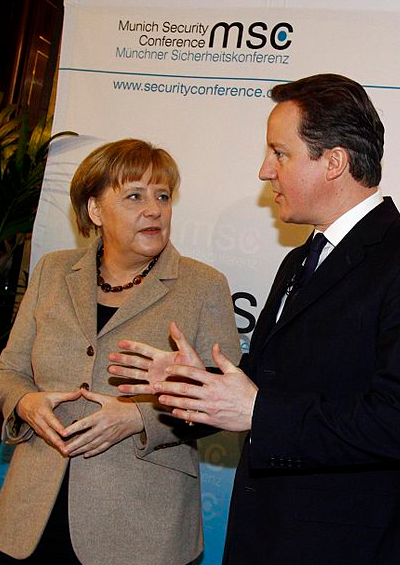Merkel’s Decision to Back Cameron is Rooted in History
Germany needs the UK as part of the EU’s dynamic core.
June 3, 2015

What are the reasons behind Angela Merkel’s apparent sympathy for David Cameron’s quest for a renegotiated settlement with the European Union?
Whether on curbing a disruptive tide of migrants from other parts of Europe, or taking steps to make Europe less bureaucratic and more competitive, the German chancellor’s message to the prime minister of UK was that she understood the British position.
Many observers maintain that curtailing free movement of people within the EU is out of the question. And yet, here was Merkel, breezily asserting that changing treaties was “not impossible.” And Germany wants to be a “constructive partner” for Britain, she continued, and “work very closely together” on renegotiations.
A new start
The Berlin meeting last Friday was free of rancor and recrimination. There was no mention of Germany’s previous comments about Britain’s presumed EU obstinacy, and its perceived inclination to always look for a British “Sonderweg,” a separate EU route for the UK.
However, one would be wrong to suppose that Merkel had experienced a sudden change of heart. There is a great deal of rationality and history behind the German chancellor’s stance.
To start with, she understands economics. Britain wouldn’t be attracting migration if its economy weren’t doing well. And this is an economy that imports a lot of German products.
Then, there is the geopolitics. Merkel has to cope with an upsurge of eurosceptiscm in France, Poland, Spain and Italy. In addition, unrest looms in Russia, Ukraine and Greece. Does Merkel want to risk losing Britain, too, on her watch? That is a consideration working in Cameron’s favor.
However, more is involved here than the problems of the present day. It’s the history.
Irrespective of the Franco-German “axis,” one of Germany’s overriding interests since the second world war has been to maintain a close rapport with Britain, a country steeped in diplomatic expertise and commitment to free markets.
The German business community – both big and small companies – would be greatly upset if Britain left the EU.
It used to be called the “Silent Alliance” in the 1980s. While France served as the emotional pillar for Germany’s reconstruction after the war, Britain was the rational anchor in a confusingly chequered world.
Konrad Adenauer, Germany’s first post-war chancellor, was frequently vexed by Britain’s mixed signals towards the emerging European community. But he knew intuitively how much would be at stake if Germany lost the British as partners.
In 1953-54, while discussing the formation of the European Defense Community, Adenauer told a meeting of the upper echelons of the Christian Democrat and Christian Social Union parties, “I would very much hope to have Britain on board, so that we may not be left alone with the more or less hysterical French.” And Britain did subsequently come up with the valuable idea of Germany joining the NATO.
Deep rooted alliances
Accommodating London, to keep it tethered to the continent, is anchored in German thinking. The arch-European Helmut Kohl lent a hand to John Major in 1991-92 over the Maastricht opt-out.
It was the same, back in 1978-79, when Britain was allowed to join the European Monetary System — but exempt from the exchange rate mechanism.
The crucial point is that, any future opt-out should not constrain Britain to do business under the single market regime.
For now, the assumption is that when Merkel said treaty change was “not impossible,” she meant that the solution to the British grievances lay in the direction of “protocols” and “opt-outs.”
Appended to existing treaties, this would probably be good enough for Cameron – if not for his more right-wing backbenchers. However, it would not conform to a strict definition of treaty change. A treaty change is unthinkable at the moment in the 28-member EU.
Still, there are other ways to a solution. Merkel and Cameron are not setting a new trend. They are following an old route – one that has proved its worth.
Editor’s note: This piece was adapted from a commentary originally published in OMFIF Commentary.


